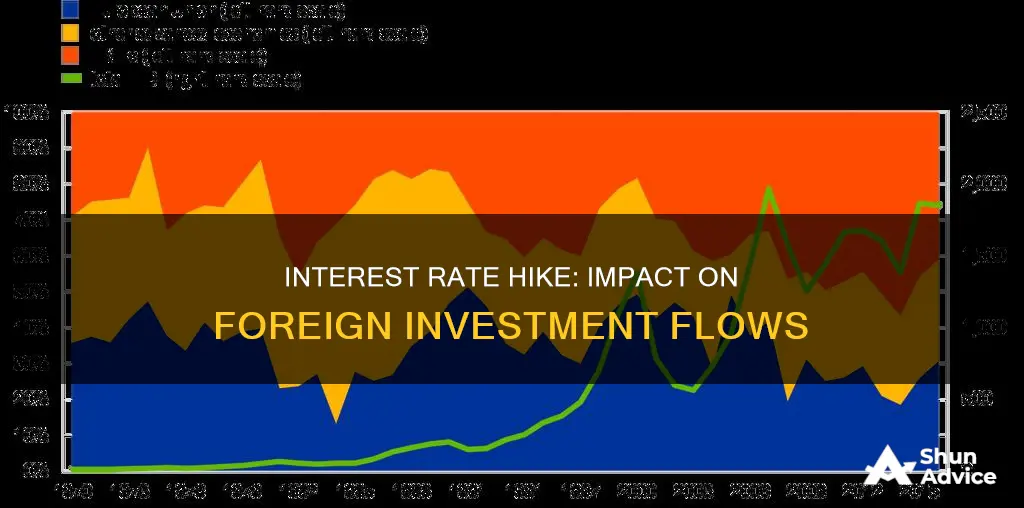
Higher interest rates tend to attract foreign investment, increasing the demand for and value of the home country's currency. This is because higher interest rates offer lenders in an economy a higher return relative to other countries. However, higher interest rates can also negatively affect business activities as credit becomes more expensive to acquire.
| Characteristics | Values |
|---|---|
| Effect on foreign investment | Increases |
| Effect on demand for home country's currency | Increases |
| Effect on value of home country's currency | Increases |
| Effect on exchange rate | Increases |
| Effect on business activities | Negative |
What You'll Learn

Foreign investment and the exchange rate
Higher interest rates tend to attract foreign investment, increasing the demand for and value of the home country's currency. This is because higher interest rates offer lenders in an economy a higher return relative to other countries. Therefore, higher interest rates attract foreign capital and cause the exchange rate to rise.
If the dollar appreciates (the exchange rate increases), the relative price of domestic goods and services increases while the relative price of foreign goods and services falls. The change in relative prices will decrease US exports and increase its imports.
The opposite relationship exists for decreasing interest rates – that is, lower interest rates tend to decrease exchange rates. Lower interest rates tend to be unattractive for foreign investment and decrease the currency’s relative value.
How to Spark Interest in Investing
You may want to see also

The impact of interest rates on the value of a country's currency
Interest rates have a direct impact on the value of a country's currency. When interest rates increase, the value of a country's currency also increases. This is because higher interest rates attract foreign investment, increasing the demand for and value of the home country's currency. Foreign investors are incentivised to invest in a country with higher interest rates because they can expect a higher return on their investment relative to other countries. This causes the exchange rate to rise.
The opposite is true for decreasing interest rates. Lower interest rates tend to decrease exchange rates because they are less attractive to foreign investors. Foreign investors are less incentivised to invest in a country with lower interest rates because the return on their investment will be lower.
For example, if an American company received foreign direct investment (FDI) from a foreign investor, the investor would need to buy US dollars (USD) to proceed with their investment. This would increase the demand for USD and hence raise its value/exchange rate against other currencies.
However, it is important to note that increased interest rates can negatively affect business activities. This is because credit becomes more expensive to acquire, which can make it more difficult for businesses to operate and expand.
Compounding Interest: Investment Products to Earn More
You may want to see also

The relationship between interest rates and foreign capital
Interest rates and foreign capital are closely related. A rise in interest rates will cause an increase in the current real exchange rate. This variation between exchange rate and interest rate consistently correlates to Foreign Direct Investment inflows and thus amplified economic development.
Higher interest rates tend to attract foreign investment, increasing the demand for and value of the home country's currency. This is because higher interest rates offer lenders in an economy a higher return relative to other countries. Therefore, higher interest rates attract foreign capital and cause the exchange rate to rise.
The opposite relationship exists for decreasing interest rates – that is, lower interest rates tend to decrease exchange rates. This is because lower interest rates tend to be unattractive for foreign investment and decrease the currency’s relative value.
If the dollar appreciates (the exchange rate increases), the relative price of domestic goods and services increases while the relative price of foreign goods and services falls. The change in relative prices will decrease U.S. exports and increase its imports.
However, increased interest rates negatively affect business activities. This is because credit becomes expensive to acquire.
Interest Rates: Impacting Investment Strategies and Returns
You may want to see also

The effect of interest rates on business activities
Interest rates have a significant impact on business activities. When interest rates increase, the value of a country's currency also increases. This makes credit more expensive to acquire, which negatively affects business activities.
Higher interest rates tend to attract foreign investment, increasing the demand for and value of the home country's currency. This is because higher interest rates offer lenders in an economy a higher return relative to other countries. Therefore, higher interest rates attract foreign capital and cause the exchange rate to rise.
The opposite is true for decreasing interest rates. Lower interest rates tend to decrease exchange rates and are less attractive for foreign investment, decreasing the currency's relative value.
The relationship between interest rates and foreign investment can impact business activities in a country. For example, if a country has higher interest rates than its competitors, it may attract more foreign investment, leading to increased economic development. However, if a country's interest rates are too high, it may decrease investment overall, as higher rates increase the cost of borrowing.
Overall, the effect of interest rates on business activities is complex and depends on various factors, including the relative interest rates of other countries and the specific business environment.
Investment Interest Expenses: Are They Taxable?
You may want to see also

The impact of interest rates on the demand for a country's currency
Interest rates have a significant impact on the demand for a country's currency. When interest rates rise, the demand for and value of the home country's currency also tend to increase. This is because higher interest rates attract foreign investment, as investors seek higher returns relative to other countries. As a result, the exchange rate rises.
For example, if an American company receives foreign direct investment (FDI), the investor needs to buy US dollars to proceed with their investment. This increases the demand for USD and raises its value against other currencies.
The opposite relationship exists for decreasing interest rates. Lower interest rates tend to decrease exchange rates and make a country less attractive for foreign investment. This is because the currency's relative value decreases, making it less appealing to investors.
However, it is important to note that increased interest rates can negatively affect business activities. Credit becomes more expensive to acquire, which can impact companies' ability to invest and grow. Therefore, while higher interest rates may initially attract foreign investment and increase the demand for a country's currency, they can also have negative long-term effects on the economy.
Mortgage Interest Rates: Higher for Investments?
You may want to see also
Frequently asked questions
Yes, higher interest rates tend to attract foreign investment.
Higher interest rates increase the value of a given country's currency, increasing the demand for and value of the home country's currency.
Higher interest rates cause the exchange rate to rise. The opposite is true for decreasing interest rates.
Yes, higher interest rates negatively affect business activities as credit becomes more expensive to acquire.
Lower interest rates tend to be unattractive for foreign investment and decrease the currency's relative value.







